

Poet Jane Kenyon’s Advice on Writing: Some of the Wisest Words to Create and Live By – Brain Pickings. By Maria Popova In Still Writing: The Pleasures and Perils of a Creative Life — one of the finest, most insightful reflections on the creative experience ever committed to words — writer Dani Shapiro mentions a set of instructions by the poet Jane Kenyon (May 23, 1947–April 22, 1995), a writing mantra of sorts, which she keeps tacked above her desk.
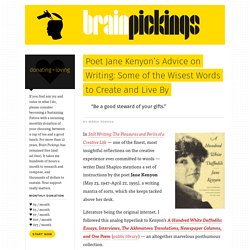
Literature being the original internet, I followed this analog hyperlink to Kenyon’s A Hundred White Daffodils: Essays, Interviews, The Akhmatova Translations, Newspaper Columns, and One Poem (public library) — an altogether marvelous posthumous collection. These uncommonly sage instructions appear in a piece titled Everything I Know About Writing Poetry — Kenyon’s notes for a lecture she delivered at a literary conference in 1991, a superb addition to this growing compendium of writers’ advice on the craft.
Tell the whole truth. Rilke on How Great Sadnesses Bring Us Closer to Ourselves. Rainer Maria Rilke’s classic Letters to a Young Poet (public library) is among those very few texts — alongside Thoreau’s journal, Anne Lamott’s Bird by Bird, and Annie Dillard’s Pilgrim at Tinker Creek — that I read like one does scripture.
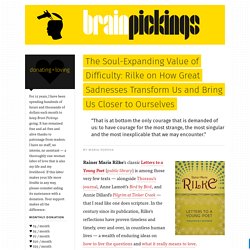
In the century since its publication, Rilke’s reflections have proven timeless and timely, over and over, in countless human lives — a wealth of enduring ideas on how to live the questions and what it really means to love. Perhaps his most piercing insight and sagest advice — not only for the recipient, the 19-year-old cadet and budding poet Franz Xaver Kappus, but for every human being with a beating heart and a restless mind — comes from a letter penned on August 12, 1904.
Long before modern psychologists extolled the creative benefits of melancholy, Rilke explores the value of sadness as a clarifying force for our own interior lives. He turns his illuminating gaze to the vast swaths of life we spend completely opaque to ourselves, and writes: Beatrix Potter, Mycologist: The Beloved Children’s Book Author’s Little-Known Scientific Studies and Illustrations of Mushrooms – Brain Pickings. Poet and Philosopher David Whyte on Anger, Forgiveness, and What Maturity Really Means. “Our emotional life maps our incompleteness,” philosopher Martha Nussbaum wrote in her luminous letter of advice to the young.
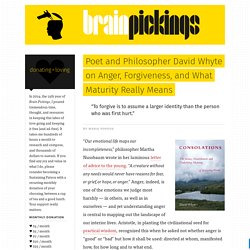
“A creature without any needs would never have reasons for fear, or grief, or hope, or anger.” Anger, indeed, is one of the emotions we judge most harshly — in others, as well as in ourselves — and yet understanding anger is central to mapping out the landscape of our interior lives. Aristotle, in planting the civilizational seed for practical wisdom, recognized this when he asked not whether anger is “good” or “bad” but how it shall be used: directed at whom, manifested how, for how long and to what end.
Many of Whyte’s meditations invert the common understanding of each word and peel off the superficial to reveal the deeper, often counterintuitive meaning — but nowhere more so than in his essay on anger. Whyte writes: Ursula K. Le Guin on the Sacredness of Public Libraries – Brain Pickings. “If librarians were honest,” Joseph Mills wrote in his delightful poem celebrating libraries, “they would say, No one spends time here without being changed…” For Thoreau, books themselves were also changed and fertilized by their cohabitation, “as if they were making a humus for new literatures to spring in.”
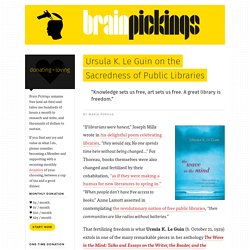
“When people don’t have free access to books,” Anne Lamott asserted in contemplating the revolutionary notion of free public libraries, “then communities are like radios without batteries.” That fertilizing freedom is what Ursula K. Le Guin (b. Creative Courage for Young Hearts: 15 Emboldening Picture Books Celebrating the Lives of Great Artists, Writers, and Scientists – Brain Pickings. Margaret Mead extolled the value of “spiritual and mental ancestors” in how we form our identity — those people to whom we aren’t related but whose values we try to cultivate in ourselves; role models we seek out not from our immediate genetic pool but from the pool of culture the surrounds us, past and present.
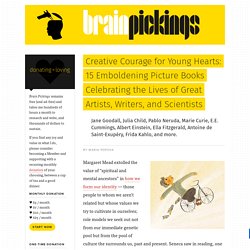
The Soul of an Octopus: How One of Earth’s Most Alien Creatures Illuminates the Wonders of Consciousness. How to Love: Legendary Zen Buddhist Teacher Thich Nhat Hanh on Mastering the Art of “Interbeing” – Brain Pickings. What does love mean, exactly?
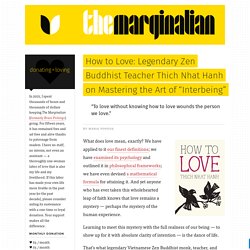
We have applied to it our finest definitions; we have examined its psychology and outlined it in philosophical frameworks; we have even devised a mathematical formula for attaining it. And yet anyone who has ever taken this wholehearted leap of faith knows that love remains a mystery — perhaps the mystery of the human experience. Learning to meet this mystery with the full realness of our being — to show up for it with absolute clarity of intention — is the dance of life. That’s what legendary Vietnamese Zen Buddhist monk, teacher, and peace activist Thich Nhat Hanh (b.
October 11, 1926) explores in How to Love (public library) — a slim, simply worded collection of his immeasurably wise insights on the most complex and most rewarding human potentiality. At the heart of Nhat Hanh’s teachings is the idea that “understanding is love’s other name” — that to love another means to fully understand his or her suffering. Echoing legendary Zen teacher D.T.
Virginia Woolf on Why the Best Mind Is the Androgynous Mind. In addition to being one of the greatest writers and most expansive minds humanity ever produced, Virginia Woolf (January 25, 1882–March 28, 1941) was also a woman of exceptional wisdom on such complexities of living as consciousness and creativity, the consolations of aging, how one should read a book, and the artist’s eternal dance with self-doubt.
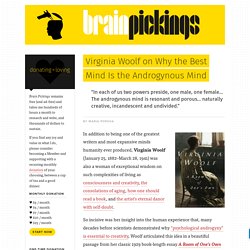
So incisive was her insight into the human experience that, many decades before scientists demonstrated why “psychological androgyny” is essential to creativity, Woolf articulated this idea in a beautiful passage from her classic 1929 book-length essay A Room of One’s Own (public library). A year after she subverted censorship and revolutionized the politics of gender identity with her novel Orlando, Woolf writes: The mind is certainly a very mysterious organ … about which nothing whatever is known, though we depend upon it so completely. Long before cognitive scientists were able to tell us exactly how the mind does this, Woolf concludes: In Defense of Boredom: 200 Years of Ideas on the Virtues of Not-Doing from Some of Humanity’s Greatest Minds – Brain Pickings. “I can excuse anything but boredom,” Hedy Lamarr famously quipped.
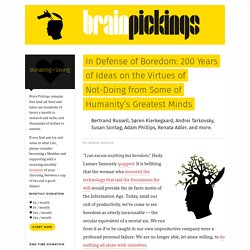
It is befitting that the woman who invented the technology that laid the foundation for wifi would provide the de facto motto of the Information Age. Today, amid our cult of productivity, we’ve come to see boredom as utterly inexcusable — the secular equivalent of a mortal sin. We run from it as if to be caught in our own unproductive company were a profound personal failure. We are no longer able, let alone willing, to do nothing all alone with ourselves. The Heart and the Bottle: A Tender Illustrated Fable of What Happens When We Deny Our Difficult Emotions – Brain Pickings. “Children … are the most attentive, curious, eager, observant, sensitive, quick, and generally congenial readers on earth,” E.B.
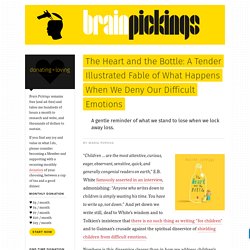
White famously asserted in an interview, admonishing: “Anyone who writes down to children is simply wasting his time. You have to write up, not down.” And yet down we write still, deaf to White’s wisdom and to Tolkien’s insistence that there is no such thing as writing “for children” and to Gaiman’s crusade against the spiritual disservice of shielding children from difficult emotions. Nowhere is this disservice clearer than in how we address children’s experience of life’s darkest moments, as evidenced by the minuscule the pool of intelligent and imaginative books that help kids make sense of death and loss. And nowhere is there more heartening an antidote than in The Heart and the Bottle (public library) by the inimitable Oliver Jeffers. The bottle couldn’t be broken. The heart was put back where it came from. Mary Oliver on What Attention Really Means and Her Moving Elegy for Her Soul Mate – Brain Pickings.
Mary Oliver is one of our era’s most beloved and prolific poets — a sage of wisdom on the craft of poetry and a master of its magic; a woman as unafraid to be witty as she is to wise.
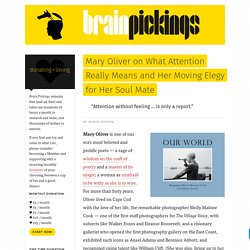
For more than forty years, Oliver lived on Cape Cod with the love of her life, the remarkable photographer Molly Malone Cook — one of the first staff photographers for The Village Voice, with subjects like Walker Evans and Eleanor Roosevelt, and a visionary gallerist who opened the first photography gallery on the East Coast, exhibited such icons as Ansel Adams and Berenice Abbott, and recognized rising talent like William Clift. (She was also, living up to her reputation as “a great Bohemian American,” the owner of a bookshop frequented by Norman Mailer and occasionally staffed by the filmmaker John Waters.) A Rap on Race: Margaret Mead and James Baldwin’s Rare Conversation on Forgiveness and the Difference Between Guilt and Responsibility – Brain Pickings. By Maria Popova NOTE: This is the first installment in a multi-part series covering Mead and Baldwin’s historic conversation. Desert Solitaire: An Uncommonly Beautiful Love Letter to Solitude and the Spiritual Rewards of Getting Lost – Brain Pickings.
By Maria Popova “As the desert offers no tangible riches, as there is nothing to see or hear in the desert,” Antoine de Saint-Exupéry wrote in his exquisite memoir of what the Sahara Desert taught him about the meaning of life, “one is compelled to acknowledge, since the inner life, far from falling asleep, is fortified, that man is first animated by invisible solicitations.” No one captures this invisible animation of inner life more bewitchingly than Edward Abbey in Desert Solitaire (public library) — a miraculously beautiful book, originally published in 1968, which I discovered through a passing mention by the wonderful Cheryl Strayed.
(How right Laurence Sterne was to call digression “the sunshine of narrative,” and Calvino to consider it, even, a hedge against mortality.) In the late 1950s, Abbey took a job as a seasonal park ranger at Arches National Monument in Utah’s Moab desert. “Why I went there no longer matters; what I found there is the subject of this book,” he writes. The Science of Stress and How Our Emotions Affect Our Susceptibility to Burnout and Disease – Brain Pickings. I had lived thirty good years before enduring my first food poisoning — odds quite fortunate in the grand scheme of things, but miserably unfortunate in the immediate experience of it. I found myself completely incapacitated to erect the pillars of my daily life — too cognitively foggy to read and write, too physically weak to work out or even meditate. The temporary disability soon elevated the assault on my mind and body to a new height of anguish: an intense experience of stress.
Even as I consoled myself with Nabokov’s exceptionally florid account of food poisoning, I couldn’t shake the overwhelming malaise that had engulfed me — somehow, a physical illness had completely colored my psychoemotional reality. Patti Smith on Time, Transformation, and How the Radiance of Love Redeems the Rupture of Loss – Brain Pickings. Nietzsche on How to Find Yourself and the True Value of Education – Brain Pickings. “Do you have the courage to bring forth the treasures that are hidden within you?” Elizabeth Gilbert asked in framing her catalyst for creative magic. Love, Lunacy, and a Life Fully Lived: Oliver Sacks, the Science of Seeing, and the Art of Being Seen – Brain Pickings.
9 Learnings from 9 Years of Brain Pickings – Brain Pickings. On October 23, 2006, Brain Pickings was born as an email to my seven colleagues at one of the four jobs I held while paying my way through college. Why We Fall in Love: The Paradoxical Psychology of Romance and Why Frustration Is Necessary for Satisfaction.